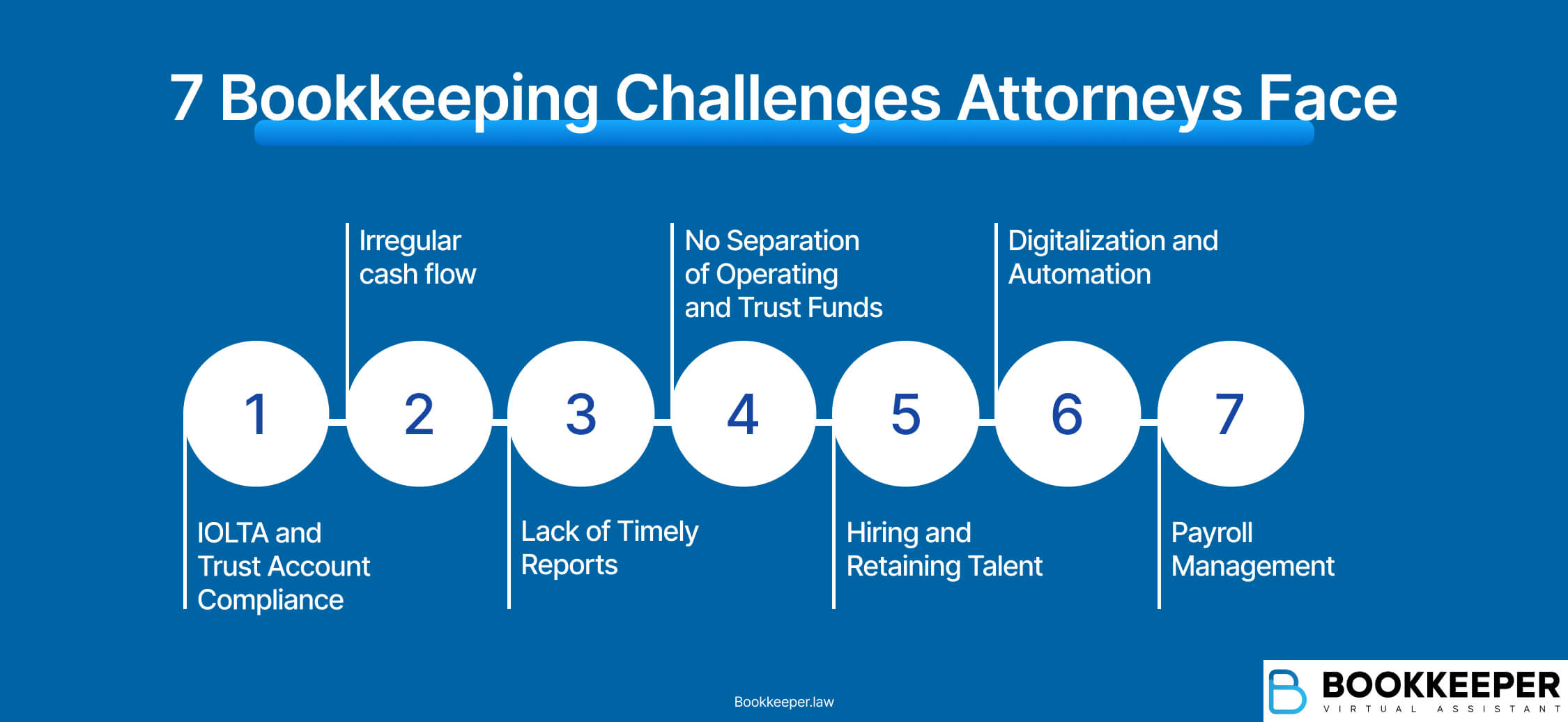Legal practice requires focus and time without having to worry about the numbers behind it. But bookkeeping isn’t something law firms can afford to overlook. In fact, 48% of lawyers are turning to credit because they regularly run out of money, showing that many attorneys struggle with poor financial management.

Here are the seven most common bookkeeping challenges attorneys face and practical ways to solve them:
1. IOLTA and Trust Account Compliance
When it comes to legal bookkeeping, no challenge carries higher stakes than trust account management. The consequences of mistakes extend far beyond financial losses—they can threaten your license to practice.
The Challenge
Trust account management is one of the most complex parts of legal bookkeeping. You're required to keep client funds separate from operating funds, track every transaction, and follow state-specific IOLTA (Interest on Lawyers' Trust Accounts) rules. One mistake can lead to penalties or disciplinary action from your state bar.
It becomes even more difficult when you're handling multiple client matters. Each client’s funds need to be tracked individually. Advance fees must be recorded properly, and earned fees should only be transferred to your operating account after the work is done.
The Solution
Implement a trust account management system that automates compliance tracking. Legal-specific accounting software that supports three-way reconciliation is ideal. Look for features like alerts for potential issues and built-in audit trails.
Aside from technology, set clear procedures for all trust-related transactions. Use checklists from tasks like receiving retainers to processing refunds. Regular monthly reconciliations should always be done, preferably by a qualified legal bookkeeper.
2. Irregular cash flow
The Challenge
Unlike other businesses, law firms often experience inconsistent billing cycles. You might receive a large settlement one month, followed by several lean months waiting for cases to resolve. This inconsistency makes it hard to budget, pay staff consistently, and maintain cash reserves for operational needs. The problem becomes more difficult for practices that rely heavily on contingency fees or handle cases with long resolution timelines.
The Solution
Use a cash flow forecasting system that tracks confirmed and projected revenue. Create a case pipeline with expected resolution timelines, even if they’re just estimates. This visibility helps you anticipate cash flow gaps and make plans ahead for expenses and investments.
It also helps to build a cash reserve equal to at least three to six months of operating costs. To improve your law firm’s profitability, consider offering new services or different payment structures to make your income more predictable.
3. Lack of Timely Reports
The Challenge
Some attorneys make decisions based only on their bank balances rather than financial data. This approach leaves you vulnerable to cash flow problems, missed opportunities to grow, or not knowing which areas of the practice are actually profitable. Without timely reports, you may not catch financial problems until it becomes serious.
The Solution
Set a monthly financial reporting schedule that includes profit and loss statements, balance sheets, and cash flow reports. These reports should be generated within 10-15 days after the month ends to remain useful for decision-making.
Build a routine where your books are updated weekly and reviewed monthly. This frequency allows you to anticipate and address cash flow issues before they impact operations. Lastly, you can also use automated reporting tools that can generate real-time reports on your firm’s financial performance.
4. No Separation of Operating and Trust Funds
The Challenge
Commingling client funds with operating funds is one of the most serious violations of legal ethics. This area is addressed in Rule 1.15 of the ABA Model Rules of Professional Conduct, which requires attorneys to keep client property separate from their own.
Yet many attorneys struggle with maintaining proper separation, especially when cash is tight. The temptation to "borrow" from client accounts can lead to major ethical violations and potential criminal charges.
The Solution
Use completely separate bank accounts for trust and operating funds. If possible, use different banks or different account types with different access controls. Never allow operating account access to trust fund accounts, and vice versa. It’s also a good idea to hire a legal bookkeeper who understands how to handle trust and operating funds correctly.
5. Hiring and Retaining Talent
The Challenge
Legal bookkeeping isn’t like general bookkeeping. It requires special knowledge of trust accounting, legal billing, and court deadlines. Finding someone with that skillset can be hard, especially for smaller firms that may not have the budget for a full-time expert. While a part-time or inexperienced bookkeeper may lack the expertise needed to handle legal accounting.
The Solution
Invest in training for your bookkeeper, even if it costs more upfront. Legal-specific bookkeeping training pays off through time savings, improved accuracy, and better compliance.
You can also consider working with a bookkeeping provider that specializes in the legal industry. This gives you access to experienced professionals without the challenges of hiring and training in-house staff. In many cases, specialized legal bookkeeping services cost less than maintaining a full-time employee while delivering the same level of expertise.
6. Digitalization and Automation
The Challenge
Many attorneys struggle with selecting and implementing appropriate accounting software for their practices. With so many legal tools on the market, making the wrong choice can result in wasted time, money, and potential compliance issues.
The challenge extends beyond software selection. Even with the right software, you still need staff training and process adaptation to make it work. Attorneys who have relied on manual processes or outdated systems may resist changes that could improve efficiency. Without proper implementation, even the best software can fail to deliver expected benefits.
The Solution
Start by evaluating your practice's specific needs before selecting software. Consider factors like practice size, case types, trust account requirements, and whether the software can integrate with your existing systems. Don't choose software based solely on price, focus on features that solve your biggest challenges.
Make sure everyone who will use the software gets proper training. Many software failures result from inadequate training rather than poor software selection. Consider ongoing training as new features are released or when you hire new team members.
7. Payroll Management
The Challenge
Payroll can be complicated for law firms, especially when dealing with contract attorneys, temporary staff, or remote workers. It’s not just about getting people paid, it also involves proper employee classification, tax filings, benefit management, and legal reporting.
The Solution
Implement a payroll system that handles tax calculations, withholdings, and reporting automatically. Create clear policies for employee classifications and overtime calculations. Document these policies and make sure all staff understand their employment status and how they’re being paid. Keep a payroll calendar that includes all deadlines for tax deposits, quarterly filings, and end-of-year reports.
Address Bookkeeping Challenges with the Right Partner
The challenges above are common obstacles that can impact your practice's success and compliance if left unaddressed. Trying to handle these responsibilities without proper expertise or systems can lead to costly mistakes and compliance issues.
The complexity of legal bookkeeping continues to increase as regulations evolve and practices grow. What may have worked when you were a solo practitioner might no longer be enough as you bring on staff or expand into new practice areas. Similarly, general bookkeeping solutions often fall short when applied to the requirements of legal practice.
Instead of trying to handle everything on your own, consider partnering with professionals who understand the unique bookkeeping challenges law firms face, and know how to solve them. At Bookkeeper.law, we specialize in helping lawyers and law firms overcome these exact issues. Our virtual legal bookkeepers work exclusively with attorneys to keep your books compliant, reflect your financial performance, and your practice positioned for growth.






